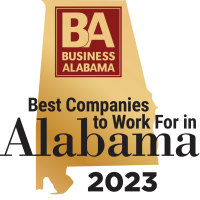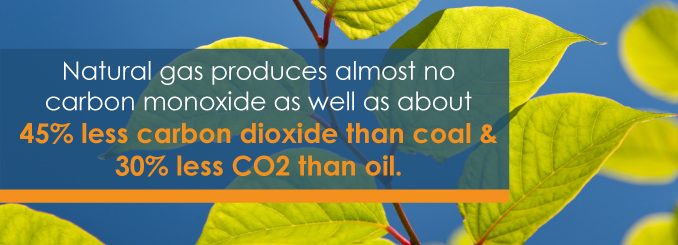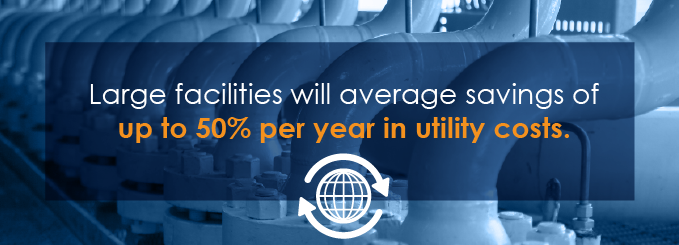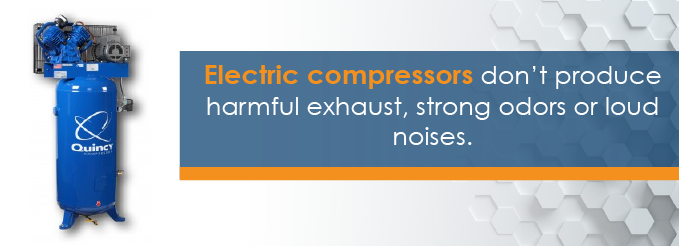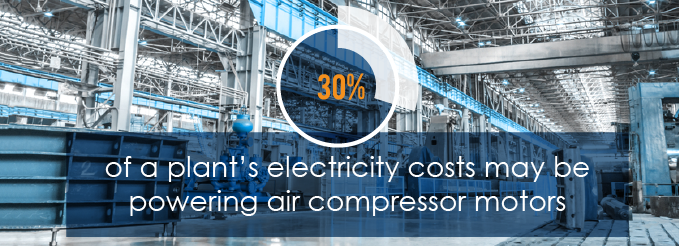Air compressors come in all shapes and sizes, which can make determining the right one to buy a difficult ordeal. This guide aims to help assist in the process by giving you a frank look at the benefits and drawbacks of some of the most common air compressors on the market.
We’re looking at electric vs. natural gas compressors because these represent some of the top options for applications in fixed locations in your business as well as for those technicians and engineers who travel throughout a job site or far into customer fields.
Your situation and requirements are unique, so it’s important to start off by looking at your location and what you want to use compressed air for throughout the year. You should also determine if you’ll need a fixed, steady supply or if you want something that’s easy to deliver power to any location.
This understanding will also help you know if you can take advantage of some of the secondary benefits of different types of air compressors, such as the heat recovery of natural gas compressors or the simpler installation and use of electric air compressors without much additional safety equipment required.
Contact Us Learn More Find a Dealer Near You
Benefits of Gas Compressors
Natural gas powered air compressors are at their best outdoors and in remote areas where they can provide consistent air pressure, strong power and long-lasting compression. You’ll see a wide range of strong and powerful compressors using natural gas as their source of power, and you can hear it when most of them rev up.
These compressors are also top options when working in remote sites or moving across your job site often because they can operate in any ventilated space. Without needing to plug in to a power source, you have more mobility and can put the compressor in the best location for workers, unrestricted by other access elements.
Your standard natural gas air compressor tends to be a heavy-duty model that will work efficiently and can power a wide range of applications. It will often deliver a higher efficiency at a partial load, with some reports noting that it can maintain its highest efficiency level when running at as low as a 30% full load.
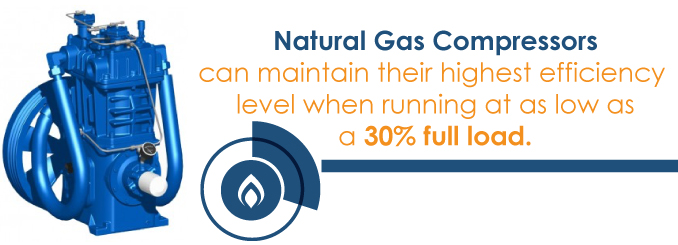
Gas compressors also have an advantage when it comes to heat recovery and using heat for other applications. The design of many natural gas air compressors includes access to the heat recovered from the cooling jacket water as well as the gas exhaust itself. Many applications such as connecting to boilers and space heating can make use of both of these elements, helping companies reduce their costs and overall utility needs.
If you’re using natural gas for multiple applications, such as to power turbines, you may be able to reduce overall plant consumption by up to 25% when you recover waste heat from both the turbines and your natural gas air compressors.
Beyond reducing the dependency on outside utilities, many companies also tout natural gas air compressors as environmentally responsible. Natural gas is extremely efficient and NW Natural notes that it produces almost no carbon monoxide as well as about 45% less carbon dioxide than coal or 30% less CO2 than oil.
Natural gas also tends to be cheap, and many experts suggest that its overall energy costs will continue to decline. Scientific American predicts that gas costs will continue to decline until at least 2035 because of new supplies, shifting demand and increased competition among suppliers all over the globe.
These compressors can also reduce the risks of sparking, which may be beneficial for your industry.
Gas Air Compressor Cons
The chief downside to natural gas air compressors is that they can produce dangerous exhaust when they operate indoors or in tight spaces with poor ventilation. All combustion-type air compressors have this risk indoors, though many often forget to include natural gas in this list.
Natural gas air compressors may generally have a lower lifetime maintenance cost, but they have significant fire risks and combustion risks when an accident occurs. Because you need to cart around the natural gas reserves, this means you’re facing risks of your staff improperly using the equipment attached to your natural gas air compressor and accidents that can occur in your fuel depot.
The typical gas compressor is also very loud. Most units will cause levels of noise that rise above distraction and can reach levels that do damage to your employees’ hearing under prolonged exposure. This means you’ll need space to help dissipate the sound as well as proper protection equipment. You should typically limit the use of these compressors to outdoors.
One mixed concern is that the initial cost of a natural gas compressor is typically higher, as is its cost of installation. However, large facilities will average savings of up to 50% per year in utility costs, paying the cost of installation back relatively quickly compared to other air compressors.
Electric Air Compressor Pros
Electric air compressors have a unique advantage because they can operate in almost any scenario where there’s access to electricity. These compressors run smoothly, quietly and produce no toxic exhaust or byproducts, making them clean and well-suited for indoor applications. Electric air compressors can work continuously, without any need to stop and refuel.
This also means they’re less distracting to your employees. Electric compressors don’t produce harmful exhaust, strong odors or loud noises, which cause other compressors to be more restricted and necessitates that workers must take a break during use.
Electric air compressors are also relatively easy to use and move, being lighter and smaller than gas air compressors because they do not need any unit or pieces to store and deliver access to the fuel source.
You can also safely store electric air compressors and move them around your job site freely because there’s no fuel risk. That allows you to place them in areas where flammable fuels would be a concern. Please note that this applies to smaller air compressors — larger electrical air compressors are often installed and fixed, so there is less portability because of the nature of their applications.
Electric air compressors also often feature a control start/stop switch. This switch automatically shuts down the motor when the pressure inside the tank reaches or exceeds a predetermined limit. The switch also turns the unit on when air pressure drops below a specific value. This setup allows the unit to operate continuously and means your staff can focus on using the compressed air, not maintaining a vigilant look at the tank itself.
In general, electric air compressors are easier to operate since the process is simpler and there’s less control over the fuel source. They also run at cooler temperatures on the whole, so there’s a lower requirement for air circulation, allowing them to operate in a wide range of spaces.
The Downsides of Electric Compressors
Up to 30% of a plant’s electricity costs may be powering air compressor motors. When electricity costs are high — or even when they fluctuate — this can cause a significant increase in operating expenses, making it harder to properly budget for the next quarter.
Electricity also plays a role in the second biggest concern of these air compressors. By being dependent upon electricity, you’re limited in where these units can be deployed. Most remote work cannot be done by electrical air compressors, and you’ll also need a power outlet that’s rated high enough to support the air compressor you’re using.
If there is a power outage, your air compressors can no longer work. Power outages may be common in your industry, or you may need to turn off the power during construction and site development. This can mean you’ve got a narrower window of when you can use your air compressor.
Many companies try to compensate for these limitations by using long extension cords, but these have their own issues. The more cords and wires in your facility, the greater the likelihood of someone tripping and becoming injured. To combat that risk, you’ll need to spend time and money to properly tape and secure cords. That time is duplicated when you need to pick up and move your compressor. For these types of applications, it’s recommended to never use an extension cord because of the dangers associated with the cords.
Electrical compressors are a smart choice for lighter jobs, but they tend to not be as heavy duty as other models, so they won’t be efficient with your more demanding jobs.
Natural Gas vs. Electric Compressors: Who Wins?
Each air compressor has its own unique set of benefits, and settling the electric vs. natural gas compressor debate really comes down to your application. At first glance, many businesses may opt for an electric compressor because of the more apparent safety concerns, but you should know that natural gas compressors are still safe in almost all applications.
The biggest concerns you’ll need to consider are your access to fuel supplies and the location — or locations — of the work you need done with compressed air. These will help you look past a one-size-fits-all approach.
Fuel Power Source
The biggest differentiator is how easy it is for you to access either natural gas or electricity at your job site. For fixed locations in factories, plants, warehouses and shops, access to electricity is virtually guaranteed. What you’ll want to do is to take a look at the outlets available to you to determine if your locations can provide the proper load for the air compressor of the size you need.
If you’re working with easy access to electricity in the right format, then you’ll be in a good shape to use an electric air compressor. Remember, this access needs to be restricted to areas where the compressor can be plugged directly into the outlet — power cords are never acceptable for an air compressor’s operation.
Natural gas air compressors can be a smarter option if you’ve got easy access to compressed natural gas because the fuel tends to be cheaper than electricity and you can always ensure you’ve got enough when the power goes out or needs to be shut off to other applications.
Natural gas compressors also work best when you need to move around the jobsite because their fuel is portable. You can create a store of this and move it with your compressor, or store it in a central location to keep better track of your usage. Natural gas air compressors also have a more fixed cost because you can only use it for as much fuel as you pre-purchase, unlike electrical units that can continue to pull current and drive up costs that may push you over budget.
Locations
Natural gas compressors require enough space for full ventilation or outdoor use. Anything less, and you risk the safety of your workers and the overall security of your company. Even in enclosed spaces, a natural gas compressor will typically be louder and require specialty protective equipment for your employees.
Electric air compressors thrive indoors where they can operate continuously and deliver consistent, quality compressed air to your workers in fixed locations. This makes electric units a top choice for manufacturing lines, workshops and other operations with limited work areas. Electrical units run quietly and have no harmful exhaust, so they are able to perform indoors without safety concerns.
Because an electric compressor can run at a lower temperature, it also may require less space for ventilation and cooling, allowing it to be installed in a wider range of areas. Pair that with the fact that these units tend to be lighter than their counterparts, and you have a versatile unit for many deployments.
While natural gas compressors perform poorly indoors, they’re a strong option when you need to use tools across a job site or are working in remote locations. Portability allows them to go as far in the field as possible, and they can power the tools you need to perform maintenance and other actions at your remote locations.
By bringing the power source alongside the unit, natural gas air compressors are common for teams that perform repairs across locations or for field engineers who provide on-site service for the customers of field service organizations.
Location is often the most important comparison point because of the hazards that natural gas compressors — and all combustion-engine compressors — pose for workers in enclosed spaces.
Find Your Perfect Compressor Now
Now that you’ve got a handle on the natural gas vs. electric compressors debate, you may know exactly what compressor you need. If you’re ready to make that call, reach out to us at Quincy Compressor here for help matching the best compressor to your needs.
Or you can contact us with your questions about piping systems, heat recovery, why you might need an oil or oil-free compressor and anything else you might need to know when you’re ready to buy an air compressor. Our experts are here to answer questions and point you in the right direction, whether you’re performing initial research or getting ready to pull the trigger.
Our goal is to provide uncompromising reliability and performance for the most demanding applications, which means our network of compressed air experts offer the best advice available. Quincy Compressor strives to provide the best equipment and user experience, and we’re here to provide advice long before you buy and long after.
Contact Us Learn More Find a Dealer Near You

